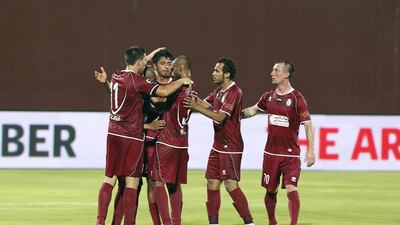When Jose Peseiro took over the reins of an injury-plagued and faltering Al Wahda team back in November, how many people would have given them a chance of finishing among the top four in the Arabian Gulf League, let alone the runners-up spot?
The team was struggling with a mere eight points from their first six league games and were eighth on the points table when manager Karel Jarolim was shown the door. Al Ahli’s tally from their first six games was 18. In the League Cup, the Abu Dhabi club had managed just one win in five matches. A change was inevitable.
“The club management decided to make the change when we still have a chance to be in the trophy trail,” a Wahda official told The National. “They have been patient with Jarolim, but didn’t see any improvement coming.”
Wahda are not really renowned for showing much patience with managers, but for once, they made the right choice by turning to the other Jose of Portuguese football: a good friend of Jose Mourinho and his classmate at Lisbon’s Superior Institute of Physical Education, and a coach known for his work with lower-division clubs in Portugal before he moved to Real Madrid in 2003 as Carlos Queiroz’s assistant.
Nobody expected Peseiro to turn around the fortunes of the team overnight, but the change did not seem very promising when he started with a 4-3 loss to city rivals Al Jazira and then shared points in a 3-3 draw at Al Wasl.
“It’s incredible,” he said after the Wasl game. “One team scores six goals in two games and still fails to win.”
Two more draws followed, before the Portuguese tasted his first win, a 1-0 victory over Al Dhafra, and that was the turning moment. Wahda lost once in their remaining 15 matches and won 10, including six in a row at the end to finish second on 48 points, three ahead of Jazira.
Peseiro always believed his team could get there, and throughout the season, he spoke of a top-four finish. “I believe in this team, I believe in my players,” he kept repeating.
He proved it during the January transfer window. He sought no replacement for the departing Mahmoud Khamis and Saeed Al Kathiri.
Peseiro was even criticised for not making any attempt to strengthen the squad, but his reply was: “My first priority is to take advantage of the talents coming through academy. I will keep giving them opportunities.”
Unlike some other coaches, he refused to moan or complain when he lost important players to injury, which happened pretty regularly. At times, they were missing as many as six to eight regulars.
Seeing the trust Peseiro had in their ability, Wahda’s youngsters responded.
“The new coach has made some tactical changes and above all, motivated us psychologically,” Wahda right-back Eisa Ahmed said in December. “Everyone will see a definite change in our mentality.”
The mentality did change, but to understand the true significance of Peseiro’s work, look at a couple of other changes this season.
At Baniyas, Adnan Hamad constantly blamed his foreign players as the team slipped down the rankings, while Hector Cuper, who arrived at Al Wasl around the same time as Peseiro, left his team in chaos. Senior pros such as Mariano Donda and Andre Senghor spent more time on the bench than the pitch and an exciting talent like Fahad Hadeed was left utterly confused.
In January, three of Wasl’s foreign players – Senghor, Milan Susak and Abdelfettah Boukhriss – were shipped out and Edson Puch, Emmanuel Culio and Ricardo Oliveira were brought in as replacements.
Four new Emirati players were also added to the squad, but in the end, Cuper left the club by mutual consent after winning only three of his 13 league matches and losing eight.
Peseiro is still here and has already committed himself to Wahda for next season, and in keeping with his coaching philosophy, decided to retain the services of all his foreign players, with a possible toss-up between the fit-again Estrada and Hermach.
That bodes well. Peseiro has already shown he is not just the “Other One” and though Al Ahli’s Cosmin Olaroiu could walk away with the best-coach honours, the Portuguese deserves a special mention for a job well done.
arizvi@thenational.ae
Follow us on Twitter at SprtNationalUAE

